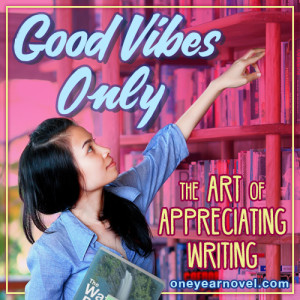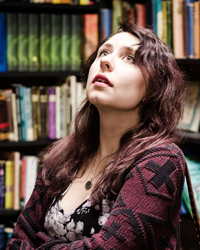Good Vibes Only: The Art of Appreciating Writing
 By Linnea Hagler, Guest Contributor
By Linnea Hagler, Guest Contributor
I will never say I hate a book (ever). Here’s why.
As aspiring authors, “constructive criticism” is something that we get a lot of. We get it from parents and mentors, peers, and anyone else who’s ever heard you say “I want to write books for a living” or held a piece of your work in their hands. We get this “constructive” brand of judgement under a lot of pretenses: we need outside sources to help us find flaws in our work that we can fix (true); we need a dose of reality (false); it’s good to evaluate your work for flaws (true); your book isn’t good until it’s perfect (false false false); your book is already good and doesn’t need help (also false), and…you get the idea.
So let’s take a poll. Raise your hand if you’ve ever gotten “constructive criticism” that really didn’t construct anything. And now raise your hand if you’ve ever read a book you didn’t like, and told a bunch of people about how much you didn’t like it. Sweet, looks like everyone.
Alright. So what’s the point of this post anyways?
Well, say what you will about needing the ability to be critical about things in this day and age, but it will surprise no one if I say that unnecessary negativity is rampant in a lot of circles. Chief among them: literature. And chief among literary circles: young people in literature. If you were to ask the greater majority of the “frequent reader” population, they would probably be able to tell you their least favorite book before their favorite. If you brought up a book that a lot of people seem to dislike, they would probably be able to hate on it for longer than they’d be able to talk about a book that they read recently and liked pretty well.
I don’t really care why we do this. The why is because we’re negative creatures by nature, and we like it when people agree with us on disagreeable matters. But when it comes to literature, to writing, to books—it’s downright toxic. Anyone who remembers the beginnings of Twilight’s fame remembers this monumentally fun thing that started to happen: book bashing.
Posts upon posts became popular for doing absolutely nothing besides tearing down what the writer didn’t like about something, because that was their opinion and they were entitled to it, and if you didn’t agree then why were you still there? Book bashing was the thing to do in the Young Adult community for a long time not because it made us feel better about our favorites, but because it was so easy.
That’s the reason I’m talking to you: criticism is easy. It is so monumentally easy to hate things. It is so, so simple to read a book (or someone’s work) and to see everything that it isn’t instead of everything that it already is.
But here’s the catch: I’m not talking about seeing what it could be. I’m talking about what it is. The exact incarnation that this thing is given to you as—be it published, self-published, or first-drafted. It is the easiest thing in the world to be handed something, to read it, and to think of all of the “potential” that it has if the author would just do these couple of things…
No.
No. Because that’s not constructive criticism. Constructive criticism builds, and to build something you have to have a foundation, right? The foundation is what you just read, and your critiques and ideas about it need to build it up from there. Not with flowery compliments or thoughts that aren’t genuine.
This isn’t about exclusively saying nice things. This isn’t about giving compliments that are not genuine. And it’s not even in refraining from expressing dislike. This is a different way of thinking about literature of any brand.
This kind of “mental shift” lies in things like deciding not to say “I don’t normally read this kind of thing, but…”, because what good does that do the person you’re critiquing? Nothing, really. It’s in deciding not to write a blog post about all of the reasons that you didn’t like That Book You Just Read, just because you didn’t like it. It’s in not saying that an author is terrible because they didn’t write something that you liked, and here’s why: what they wrote, somebody liked, and if it wasn’t you, you’re not who they were writing for.
You don’t have to be invariably sunny about everything all the time in order to keep your view of it positive. There are flaws in every book you’ll ever read, and every book you’ll ever write as well, and it’s good to see them. But the way I look at it is this: I know exactly how difficult it is to write a book. And I know how much more difficult it is to write a “good” one. So if someone else went through half the trouble I did to write and distribute their work, it does not deserve my hatred. That feeling does me no good, as I can’t use it, and it does the author of the thing no good, as they can’t build off of it.
It comes down to this: we live in a world where books exist, and a world where we can all write about whatever the heck we want to. That’s a privilege. Reading other people’s writing is a privilege. So while it’s good to have the ability to see the negative in things? There really isn’t ever a good enough reason to focus on it. And if your negative view won’t build something positive, then it doesn’t really need to be given.
Writing is hard, you guys, and we beat ourselves up about it enough. We work in a high risk/low reward art. There’s that saying to consider: you are your own harshest critic. So if you’re already hanging yourself out to dry, don’t you think everyone else is too? Writing is something you’ll never do well if you don’t enjoy it at least a little, and it is very, very difficult to enjoy doing something when you get yelled at for it all the time.
I believe that as much as there is an art to writing, there is an art to appreciating writing, and this is something that we as a community can never value enough. This is something that is undervalued and largely not even considered.
This is what I build on: good vibes only. The next time you find yourself falling into those habitually negative thought patterns, stop and think about them, and think about what they’re doing. Because in the end, it comes down to this: I love books. That’s the reason I’m doing this whole writing thing in the first place. And that endeavor, even more than anything else, deserves our positivity. Because we’re all in this together, and it’s a whole lot easier when we embrace that.
…
What stories do you love?
…
Linnea is an author and avid Young Adult reader with a deep-seated love for scary stories and a penchant for harboring fictional criminals. She has been a part of the OYAN community for going on seven years now, and has attended six Summer Workshops. She also attended Madcap Retreats’ 2016 Aspiring Authors Workshop with Natalie C. Parker, Tessa Gratton, and Kiersten White, and she lives her life to go to book festivals. She currently resides in Dallas, Texas, and is studying dance at her local community college. Linnea blogs at www.somebooksare.wordpress.com, and you can also find her on Instagram @somebooks.are.
* Please note that links on The One Year Adventure Novel Blog to other websites and blogs do not constitute an official endorsement. We are not intimately familiar with all the writing and opinions contained in outside links.




Thank you, Linnea! 😀
This cannot be stated enough.
So many times you find people ranting about writing, art or other people’s views, when (if they disagree with something) they could at least say it gently and briefly while others who appreciate it can fill up the comments instead.
Great work, and keep on writing. 🙂
My favorite books are Bryan Davis’ *Dragons In Our Midst* Series (along with a majority of his other books X} ).
Hello, Linnea very good article,
Thanks for sharing, keep up the good work.